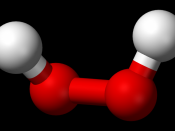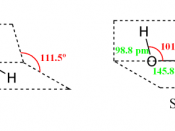took a long time with lots of research Well Presented
Aim: 'To see what factors affect the decomposition of hydrogen
peroxide by the enzyme catalase which is found in the liver'
Introduction: Enzymes are biological catalysts. They speed up the chemical reactions which go on inside living things. Without them the reactions would be so slow that life would grind to a halt. Enzymes work by when a substrate molecule bumps into a molecule of the right enzyme, it fits into a depression on the surface of the enzyme molecule. This depression is called the active site. The reaction then takes place and the molecules of product leave the active site, freeing it for another substrate molecule.
Hydrogen peroxide is a waste product produced during respiration. Hydrogen peroxide is produced to kill off dangerous bacteria. The hydrogen peroxide is broken down, so that it can not be dangerous anymore, into water (which is given off when you perspire) and into oxygen (which can be given off when you exhale).
A toxin like hydrogen peroxide must be broken down because if it is kept in the body for too long it can react with cell walls and damage them or break them down.
The variables that affect the decomposition of hydrogen peroxide are:
1. The temperature of the liver
2. The surface area of the liver
3. The pH of the hydrogen peroxide
4. The concentration of the enzymes
The two variables I am going to look at are temperature and surface area.
Hypothesis: I think that when we test the surface area the bigger the surface area the quicker the reaction will be. This is because there are more liver particles that will be exposed to the hydrogen peroxide,
therefore the liver that is ground up will be the quickest...


